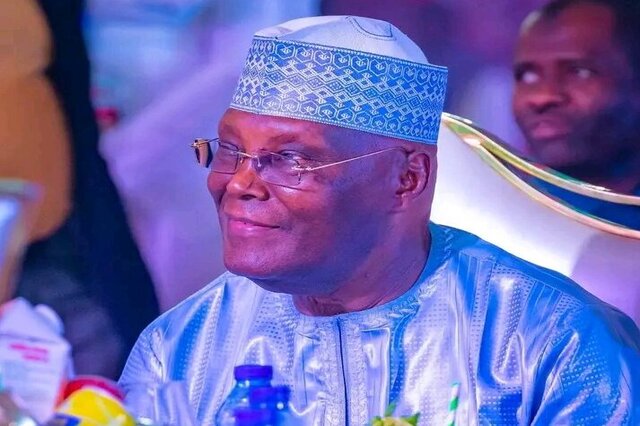Abuja – Campaigning around the country for Nigeria’s opposition People’s Democratic Party (PDP), ahead of Saturday’s election for the country’s top job, former vice president Atiku Abubakar is treading a familiar path.
This week’s election will be the wealthy 76-year-old’s sixth attempt in three decades to claim the Aso Rock presidential villa in Abuja.
Vying for the top job in Africa’s most populous country, Abubakar will face his main rivals Bola Tinubu from the ruling All Progressives Congress (APC) party and Peter Obi, the surprise third frontrunner from the Labour Party.
Born in the northeastern state of Adamawa, in a town close to Cameroon, Abubakar is Muslim and from the Fulani ethnic group, as is current president Muhammadu Buhari, 79, who steps down after completing his two terms.
Despite a humble background and having a father opposed to Western education, Abubakar – widely known as “Atiku” in Nigeria – eventually enrolled in school and university before embarking on a successful career.
To RECOVER Nigeria, we must vote—and vote in large numbers for the PDP. -AA pic.twitter.com/roxnw72Mm1
— Atiku Abubakar (@atiku) February 22, 2023
Throughout his life, he has displayed a passion for English football team Arsenal, a love of spicy jollof rice, and the music of Fela Kuti. But he is better known as a dogged politician and rich businessman.
In the 70s and 80s, Abubakar rose through the ranks of the customs service, before moving to the private sector, developing businesses in oil, agriculture and other sectors.
He turned to politics in the 90s, during Nigeria’s military rule, and ran for governor of his home state as soon as a civilian government was restored.
Despite winning that election, he instead accepted to become vice-presidential candidate to Olusegun Obasanjo. They won, and Abubakar held the deputy executive role until 2007.
Graft allegations
In his eight years in office, Abubakar oversaw the privatisation of hundreds of loss-making, corrupt or poorly managed public firms.
Even then, critics claimed he also profited on the side, making millions of dollars from graft — but he has never been convicted.
He is named in a US Senate investigation about $40 million in suspect funds transferred into the United States by offshore corporations to US bank accounts.
He denies any wrongdoing.
“Lots of things have been said about him which makes it difficult for some to have faith in him,” Olutayo Adesina, history professor at the University of Ibadan, told AFP.
But as “somebody who cares about his place in history”, Adesina believes the former vice president might “want to correct the impression people have about him.”
ALSO READ | Former Nigeria vice-president rolls dice for sixth presidential run
Equipped with a forceful personality, Abubakar is someone who aims for what he wants and “goes all the way”, said analyst and veteran journalist Dulue Mbachu.
Over the past two decades, “he has built a very strong platform, and has all kinds of political connections, so that gives him an advantage compared to others.”
Since stepping down from office, he has tried to secure the presidential nomination for several parties, including the APC in 2015.
He returned to the PDP for the 2019 election and played on his reputation as a businessman with a slogan “Get Nigeria working again”.
After Abubakar lost to Buhari, “nobody thought he would come out again to contest, but he has… He’s a cat with nine lives!” said Adesina.
Brushing off criticism about his old age, Abubakar, who currently has two wives and 29 children, has said that he has “the mental and physical energy to serve”.
Liberal style
The five key areas he has promised to tackle are insecurity, the economy, restoring the unity of Nigeria, investing in education, and devolving more resources and powers to regions of the federation.
Nigeria is not only battling a more than decade-long jihadist insurgency in the northeast and kidnapping gangs in the northwest and centre, there are also separatist agitations in the southeast.
Abubakar is among those who believe that the current centralised system inherited from military rulers has created a feeling of injustice in some regions and given rise to secessionist activity, according to Mbachu.
“He has said that the first thing he would do is devolve powers to the states and regions and weaken the centre,” said the analyst.
Another key focus for a Nigerian president is diversifying the oil-dependent economy.
“A more liberalised style that pays attention to businesses and loosens grip on the centre and tries to stimulate other regions… that’s a way Atiku (Abubakar) might help,” said Mbachu.
“But of course, when he gets to power, political realities might kick in.”
The continent’s largest economy is still recovering from the impact of the coronavirus pandemic and the fallout from the Ukraine war has increased fuel and food prices, with the World Bank projecting inflation pushed five million more Nigerians into poverty in 2022 to a total of around 95 million or nearly half the population.
Follow African Insider on Facebook, Twitter and Instagram
Source: AFP
Picture: Twitter/@munir_assalafiy
For more African news, visit Africaninsider.com


